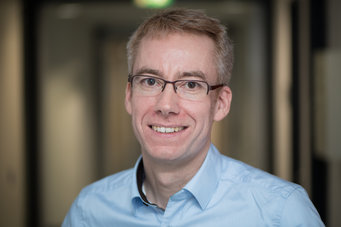Ropers will in the future head the Department of Ultrafast Dynamics at the Max Planck Institute (MPI) for Biophysical Chemistry, where he will initially conduct research with a smaller team until a new research building will be completed.
“We are extremely pleased that Claus Ropers becomes our new colleague,” says Marina Rodnina, Managing Director of the institute. “Claus Ropers pursues very original strategies with which he realizes sophisticated experimental approaches. With his visionary ideas and creativity, he has initiated many innovative research avenues and has entered new dimensions in time-resolved electron microscopy,” Rodnina says.
Observing ultrafast processes in slow motion
The experimental physicist and his team investigate the structural, electronic, and magnetic dynamics in solids, nanostructures, and surfaces. Thereby, the researchers want to answer fundamental questions that are also of technological relevance: How do the complex properties of materials emerge? How do photovoltaic energy conversion processes take place? To do so, Ropers needs to develop new experiments. “This makes my research field particularly attractive,” the newly appointed Max Planck Director explains. “I'm excited that with new experimental approaches we can now, for the first time, observe and investigate processes that were previously hidden. We are looking at ultrafast processes in the microscopic world of atoms and molecules, occurring within femto- and picoseconds – in other words, trillionths and quadrillionths of a second – in extreme slow motion, so to speak.”
To reveal such ultrafast movements, Ropers and his group use extremely short electron pulses that they generate with a laser. In their experiments, the physicists combine a high temporal with a high spatial resolution, using a so-called ultrafast transmission electron microscope. This enables the researchers to image finest changes in atomic structures – with previously unattained temporal precision. Furthermore, this technique makes it possible to observe very fast magnetic switching processes that could be used in future digital memories.
Generating shorter electron flashes
One of the most recent successes of the Göttingen team is that they are now able to control the beam of an electron microscope with laser light in space and time, forming even shorter electron flashes. Along the way, the researchers have demonstrated some fundamental quantum phenomena in the interaction of light and electrons.
In the coming years, the department aims to use the possibilities at the MPI for Biophysical Chemistry to develop further unique instruments. The researchers, for example, want to realize a completely new electron microscope with which they can film elementary processes in individual atomic and molecular layers.
After studying physics at the University of Göttingen and the University of California, Berkeley (USA), Ropers worked at the Max Born Institute in Berlin and received his doctorate at the Humboldt-Universität zu Berlin in 2007. After a year as project leader at the Max Born Institute, he returned to the University of Göttingen in 2008, where he initially worked as a junior professor with tenure track, heading the research group Nano-Optics and Ultrafast Dynamics. In 2011, the University appointed him as professor at the age of only 34 years. Since 2013, he has held the professorship for Experimental Solid State Physics and has been managing director of the IV. Physical Institute – Solid State and Nanostructures since 2014. He has received numerous awards for his work, including the Carl Ramsauer Prize of the Physical Society of Berlin, the Walter Schottky Prize of the German Physical Society, the Klung Wilhelmy Science Prize, the Ernst Ruska Prize and the Leibniz Prize of the German Research Foundation.
Contact
Prof. Dr. Claus Ropers
Department of Ultrafast Dynamics
+49 551 39-24549cropers@...
Dr. Carmen Rotte
Press Officer and Head of Public Relations
+49 55 1201-1304
carmen.rotte@...


